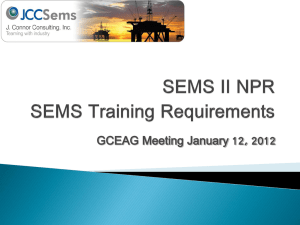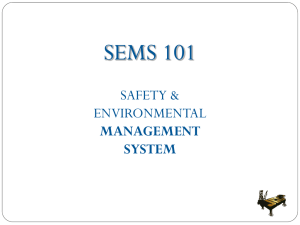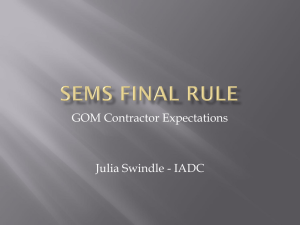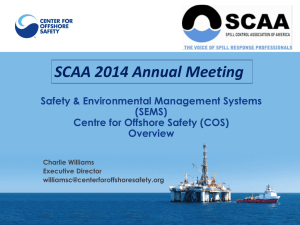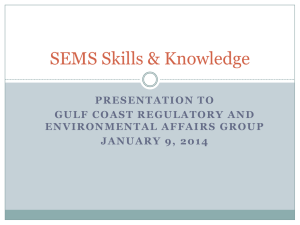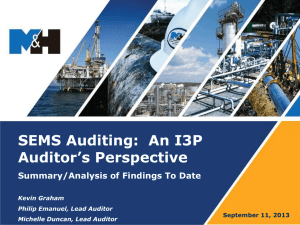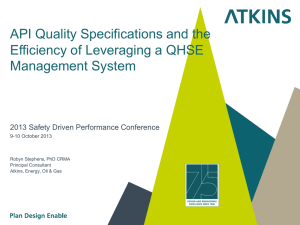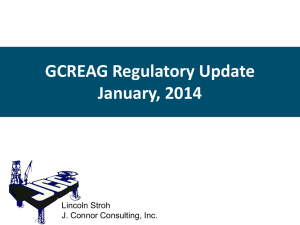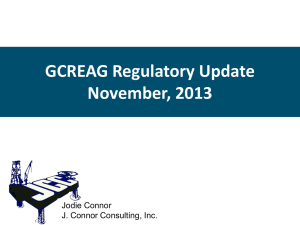SEMS FINAL RULE - SUBPART S Review & Solutions
advertisement
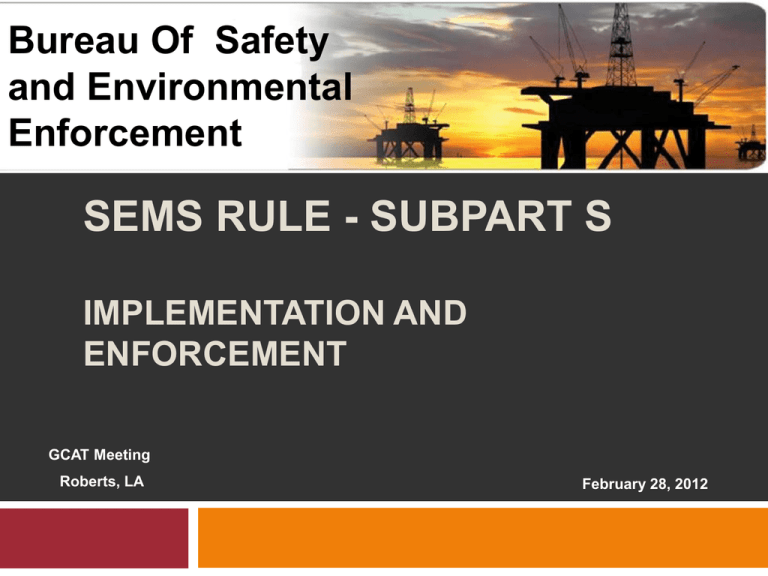
Bureau Of Safety and Environmental Enforcement 1 SEMS RULE - SUBPART S IMPLEMENTATION AND ENFORCEMENT GCAT Meeting Roberts, LA February 28, 2012 TODAY’S DISCUSSION SEMS Implementation Scheme BSEE Observes Operator-Initiated Audits BSEE-Initiated Audits BSEE-Directed Audits SEMS II New provisions Enforcement Expectations SEMS - Important Dates 3 DATE EVENT 10/15/10 SEMS Final Rule Published 9/14/11 SEMS II NPR Published 11/14/11 SEMS II NPR Comment Period Closed 11/15/11 Mandatory Implementation of SEMS 11/22/11 SEMS PINCs are online 12/5/11 3/5/12 BSEE Observed Operator Conducted SEMS Audit (I3P) BSEE SEMS-Initiated Audits 3 SEMS Resources Headquarters Chief – Operational Safety Branch (OSB) National SEMS Coordinator SEMS Regional Coordinator GOMR Chief - Office of Safety Management (OSM) BSEE SEMS RESOURCES SEMS Specialist SEMS Specialist SEMS Regional Coordinator Pacific Regional Supervisor Field Operation Petroleum Engineer Sr. Production Engineer SEMS Regional Coordinator Alaska Regional Supervisor Field Operation SEMS Specialist SEMS Resources Headquarters Chief Environmental Enforcement Division GOMR Supervisory Environmental Scientist BSEE SEMS RESOURCES Pacific Supervisory Environmental Scientist Alaska Supervisory Environmental Scientist Environmental Scientist Environmental Scientist Environmental Scientist Environmental Scientist Environmental Scientist Environmental Scientist Environmental Scientist Environmental Scientist Implementation Plan The following are methods that BSEE can use to evaluate compliance with Subpart S. Operator-Initiated Audits I3P/DQP BSEE Observes BSEE reviews audit report and monitors CAP BSEE-Initiated Audits BSEE may conduct SEMS audits for operators based upon performance BSEE-Directed BSEE Audits may direct an operator to conduct an I3P audit of their SEMS program Operator Initiated Audit Operator must notify BSEE at least 30 days in advance Lessee or I3P audits program List of facilities DQP or I3P 2 years from the initial implementation of the SEMS program and at least once every 3 years thereafter Comprehensive audit (all elements) BSEE reviews operator audit report and Corrective Action Plan (CAP) BSEE monitors CAP BSEE-Initiated Audit *BSEE-initiated audits will evaluate the operator’s: compliance with Subpart S /API RP 75 compliance with their own SEMS program effectiveness of implementation and effectiveness of communication amongst company personnel and contractors If BSEE conducts audit in lieu of I3P: We will provide operator a report within 30 days of audit completion Operator must submit CAP within 30 days of receiving BSEE’s audit report *NOTE: An audit should not be confused with a traditional inspection performed by BSEE for the purposes of gauging compliance with BSEE – Directed Audits Once notified operator must: Hire I3P to conduct audit (250.1925) Pay for all costs Ensure I3P provides BSEE within 30 days of audit completion Outline the results of audit Deficiencies identified Correction plan SEMS II - Points of Interest JSA (modifications) Only I3P conducts audits Stop Work Authority Ultimate Work Authority Employee Participation Program Reporting Unsafe Working Conditions 10 SEMS II NPR Comments 34 sets of comments submitted to BSEE on the SEMS II NPR Themes: Jurisdiction Independent Third Party (I3P) Holistic Regulatory System Process Safety Job Safety Analysis (JSA) Ultimate Work Authority (UWA) Stop Work Authority (SWA) BSEE Oversight Auditing (Onshore & Offshore) Complete or partial Announced Compliance w/ requirements of Subpart S (API RP 75 & additional provisions) Records review Interviews/discussions Participate in safety meeting/JSA observation I3P/designated and qualified personnel Documentation of contractors BSEE Enforcement Philosophy 62 new SEMS PINCs If operator has no SEMS documented: If operator has a SEMS but demonstrates no evidence implementation: Warning, component or facility shut in INC or a civil penalty If operator has a SEMS and evidence showing only partial implementation: Component or facility shut in INC or a civil penalty SEMS INCs If operator has a SEMS and shows a good faith effort on implementation: BSEE to work with operator to improve SEMS implementation Summary 14 SEMS II Final Rule expected in calendar year October 2012 BSEE has started observing operator conducted audits and performing our own audits Anticipate varying degrees of SEMS implementation and compliance Firm enforcement actions including INCs (w,c,s), civil penalties and working with operator towards continual improvement BSEE will monitor CAP closely Q&A as Submitted to BSEE Contractor Questions 1. Will an advocate, who understands the operator's SEMS and business model, be allowed to participate in the audit process? The answer is yes if the advocate did not participate in the development of the operator’s SEMS. 2. Will there be flexibility to allow for various means of reaching the same objectives? The answer is yes as long as you are in compliance with API RP 75 and 30 CFR 250. SEMS is a risk-based program and different methods can be used to achieve desired results. BSEE will require evidence that the objectives were defined according to the risk exposures and that objectives were met and recorded. 3. Have any I3P organizations come forward yet? If so, how are they and what criteria makes them acceptable to BSEE? BSEE has been involved with one I3P audit conducted in the Pacific region. BSEE participated as an “observer”. The agency reviewed the I3P’s qualifications as defined in the audit plan, in accordance with 30 CFR 250.1926. The I3P’s qualifications complied with the regulation. BSEE will not release the name of the operator or I3P. 4. What steps will be taken to ensure uniformity and consistency in SEMS enforcement? BSEE has formed Regional SEMS teams which are overseen by the National SEMS coordinator. The teams have developed a PINC list which defines the audit process and how to address deficiencies. The PINC list ensures a uniform approach for enforcement. As far as consistency, this will be handled Nationally. 5. Will BSEE publish its audit protocol? If not, why not? The original stance was, no, it would not be made public because somehow that would give an advantage to the operators. If anything, it will only allow operators to know where the goal post is. PINCs provide the scorecard for regulatory achievement. Since the objective of SEMS is to improve EHS performance, BSEE’s audit protocols will not be shared. Release of these protocols could result in industry focusing on the protocol rather than their internal EHS challenges. BSEE will ensure through it’s internal training program that our auditors are capable of auditing SEMS programs within the context of the operator EHS risk profile. 6. When will the SEMS II Final Rule be published? Will it be close to the proposed rule? Headquarters has suggested that the SEMS II final rule will be published around July/August 2012. BSEE is currently reviewing and addressing comments received on the proposed rule. At this time it is premature to comment on what the final rule will look like in comparison to the proposed rule. 7. Will there be additional SEMS rulemaking, re: the investigation findings from Macondo? Based on experience BSEE and industry gains with implementing SEMS we may or may not issue another rulemaking after SEMS 2. BSEE is still looking at all the reports, studies, etc. on DWH. This evaluation coupled w/ experience gained in implementing SEMS will determine if their are additional rulemakings 8. SEMS II will require operators to “nominate” an Independent Third Party (I3P) to audit their SEMS program, subject to BSEE approval. BSEE will not certify individuals or companies to conduct I3P audits. BSEE requires I3P auditors to meet the requirements defined in 30 CFR 250.1926. BSEE has the ability to evaluate any I3P’s qualifications by auditing documents, procedures or interviews. If BSEE identifies issues associated with a specific I3P, we have the authority to disallow them to conduct audits. 9. Will BSEE accept information in the form of resumes of potential I3P auditors for review and approval? BSEE will accept any supporting information that shows the subject I3P is in compliance with 30 CFR 250.1926. A resume is an acceptable document. For the I3P audit BSEE observed in the Pacific Region the company submitted an audit plan with a paragraph response on each element in 30 CFR 250.1926. 10. Will BSEE evaluate the overall contractor/consultant company in its approval process? If so, what company-wide criteria will BSEE be looking for? Per 30 CFR 250.1926(c), BSEE has the ability to evaluate I3P qualifications by auditing documents, procedures or interviews. If BSEE identifies issues associated with a specific I3P, we have the authority to disallow them to conduct audits and/or evaluate the entire consulting company the I3P is associated with. 11. With regard to conflict of interest, if a contractor developed only a portion of an operator’s SEMS program, (e.g., Operating Procedures), will that contractor be excluded from auditing all other elements of that operator’s SEMS? To avoid a conflict of interest, the Operator must require that the I3P be independent from the development or implementation of the SEMS program. A statement signed by an Operator’s management that the I3P auditor is not owned or controlled by or otherwise affiliated with the Operator’s company is needed. 12. In the event a nominated I3P auditor is NOT approved by BSEE, will the contractor receive a reason/explanation for the denial? Yes. If the National or Regional SEMS Coordinator determines that the proposed I3P auditor does not meet the qualifications set forth in the regulations, or that past or existing relationships with the I3P auditor could affect the I3P's ability to exercise independent judgment while conducting the SEMS audit, BSEE will send a disapproval letter to the operator. Another I3P auditor must be proposed by the operator by letter within thirty (30) days and sent to the National SEMS Coordinator and the Regional SEMS Coordinator. If BSEE accepts the operator’s proposed I3P or DQP, a response is not necessary. Lessee Questions 1. When doing an MOC for personnel change, such as changing out operators, contract operators, roughnecks, P&A personnel, etc., does this include all personnel or is it just supervisors, operators and above? Please refer to NTL No. 2001-N09 and 30 CFR 250.1912(a)(3). No. An MOC is not required for the normal shift change out of personnel. Yes. An MOC is required when an operator is using a new contractor, supplier etc. 2. Does the agency support the Center for Offshore Safety's work on accreditation of third party independent auditors for SEMS auditing? BSEE is monitoring the efforts of COS closely. We are not just monitoring their auditing efforts but other efforts such as developing leading/lagging performance indicators. At this present time BSEE has not formally acknowledged COS auditing efforts 3. We audit our contractors for the existence of a knowledge, skills and ability methodology to train and evaluate personnel. We do not obtain individual training records. Will that pass on an audit? Operators need not track the training records of individuals unless it is described as a control in their SEMS program. However, the tracking of individual training may be the most efficient method of overseeing your contractors. 4. I am having problems getting the "supervisor of the person in charge of the task" signature for contractors. The supervisor may not be at the site. What are my options? The supervisor of the PIC of a task must approve a JSA prior to the commencement of work. This approval can be either by email, by a web-based program, or in writing as defined in the operator’s SEMS program. If you allow for email, electronic signature, or web-based program approval, it needs to be addressed in your SEMS plan. BSEE will require a formal traceable authority process at all times. 5. SEMS PINC # S-401: The PHA is required for all facilities in the GOM. Is the API RP 14C review the minimum required for satellites and caissons? There is no requirement for a “minimal” HA on a facility. The decision on what type of HA to perform should be based on the relative “risk” associated with a particular facility, including unmanned caissons. BSEE will only issue a S-401 INC (INC number is no longer accurate) if an auditor determines an operator did not conduct a HA in accordance with their SEMS plan. Note: Operators need to be able to justify their selection of risk assessment methodologies used. This justification should include the ability to link the risk exposure evaluation to the methodology used. Records should be available during an audit which explain this process. 6. In addition to PHA’s for all facilities, are we required to have design basis for relief system available for inspectors? Operators must have design basis for relief system for all facilities; however, they will not be required to be made available during an inspection (different then an audit). If a BSEE audit is conducted ALL documents should be made available to ensure compliance with the regulations and your SEMS plan, including the relief system for your facility. 7. Will the District Inspectors be the ones going offshore to inspect for compliance to SEMS? BSEE audit teams will be made up of personnel from the Regions, Districts and HQ. If an inspector conducting a normal inspection (non-SEMS audit) identifies a safety management issue, they can make a recommendation to the Regional SEMS coordinator about such issues. Our day-to-day field inspections are not intended to be SEMS audits. 8. Is the agency considering retracting/rescinding NTL 2011- N09? The NTL was not issued until 10/21/2011 which was less than one month before the SEMS rule was to become effective. How do you expect industry to comply with the NTL when it is issued almost a year after published date and less than 30 days prior to the effective date of the rule? BSEE will not be retracting/rescinding NTL 2001-N09. The NTL is a direct result of guidance/clarification requested by Operators on the SEMS rule. The issue date of the NTL had nothing to do with the SEMS effective date (11/15/2011). 9. NTL 2011-N09, under 2. Environmental Information, states, “Environmental resources to be considered in your SEMS program include but are not limited to: biological resources including protected species, chemosynthetic, and benthic communities, Archeological and Cultural resources.” Question is “What is the citation in Subpart S and in RP 75 that identifies that these items are to be included in the SEMS plan/program? Environmental concerns needing to be addressed in SEMS go beyond Subpart S and API RP 75. Environmental issues that need to be addressed in a SEMS program are based on the lease document (archeological, biological, marine mammal stipulations), approved plans (POE, DPP, DOCD, DWOP, Pipeline), approved permits (APD, APM) and associated Conditions of Approval. 10. Is industry correct in understanding that the audit report, required by 250.1920(c), and the corrective action plan, required by 250.1920(d), must be submitted within the same limited timeframe? Yes; both the Audit Report and CAP need to be submitted within 30 days. If BSEE has issues with your proposed schedule to correct any deficiencies we will have14 days after receipt of the CAP to inform you that your proposed schedule is not acceptable. BSEE will also inform you, in writing, that your proposed schedule is Acceptable. 11. What is the timing of the SEMS 2 final rule and when can industry expect to see it published? Headquarters has suggested that the SEMS II final rule will be published in the July/August, 2012 timeframe. 12. What is BSEE’s anticipated effective date of the rule? At this time BSEE anticipates that the effective date of the final SEMS II rule will be November 2013. This allows for completion of the first 2 year SEMS audit cycle. 13. Will the SEMS 2 final rule require the use of I3P only to conduct the required audits? What information was used by the agency to justify the proposal? This concern is currently being evaluated by BSEE. The Agency believes that the use of an I3P will provide for increased objectivity in regards to improving personnel safety and achieving environmental protection as compared to utilizing a designated and qualified person of the operator. 14. Regarding the “Reporting of unsafe working conditions”, what was the purpose of this proposal when the current regulation at 250.193 already has similar language? Did you consider abandoning the proposed regulation and consider amending the current regulations? There is a difference between what is presented in SEMS II and what is required by 30 CFR 250.193. 250.193 does not address the reporting of unsafe work conditions in a comprehensive manner while SEMS II does. SEMS II address the reporting of these events, provides a nationwide phone number for reporting, assures anonymity and requires training as related to unsafe work conditions. 15. What is BSEE’s expectation for a Pipeline Transmission company which owns and operates a DOT regulated transmission pipeline and the associated offshore structures installed under a DOI/BSEE issued ROW permit? Are these pipeline companies, who do not have any leases, produce or drill wells, expected by BSEE to Develop and implement a SEMS program under 30 CFR 250, Subpart S? Please refer to NTL No. 2011-N09. Policy item 1: “Who needs a SEMS program?” As defined in 30 CFR 250.105, “You” as used in Subpart S, includes a lessee, the owner or holder of operating rights, a designated operator or agent of the lessee(s), a pipeline right of-way holder, or a State lessee granted a right-of-use and easement. 16. When does the BSEE plan to begin inspections? BSEE does not conduct inspections in regards to SEMS implementation. The agency conducts audits. BSEE will conduct our first audit the week of March 5th. During this SEMS audit, BSEE will visit both the onshore office and offshore facilities. 17. Will the BSEE audit all 13 elements of SEMS at once or audit certain elements in stages? BSEE will conduct both comprehensive and partial audits. The BSEE audit team will determine whether the audit will address the entire SEMS program or only parts of it (complete vs. partial). Note: Operators need to be ready to be audited on all elements. 18. What does the BSEE expect for operators to provide to prove contractor competency during an audit? To prove contractor competency, BSEE auditors can interview/test contractors during either the onshore or offshore components of the audit. BSEE can review your SEMS program to confirm that it includes provisions for evaluating the skills/knowledge/training of your contractors and that you are following through as written in the SEMS program. Note: Operators need to define what contractor evaluations/verifications they will implement and be ready to provide records of implementation. 19. What is the expectation of the information turnover during property transfer? Specifically: A. if I acquire a platform and 6 months later am audited by BSEE, is it my responsibility to ensure that I have information going back the required 2 to 6 years (i.e. testing and inspection data, MOC data, etc) This process should be covered by the pre-startup review process and if any non-solvable compliance issues occur, it should be communicated to BSEE BSEE does expect you to have a current and up-todate HA for the acquired facility at the time of acquisition and that this facility is fully addressed in your SEMS. B. If I acquire a platform, is it BSEE’s expectations that I will write operating procedures re-written to my company’s standards prior to operating the platform? Does BSEE recognize the potential impact? Current and up-to-date operating procedures need to be in place upon acquisition of a facility. 20. What is the agency’s expectation to documentation of Ultimate Work Authority? Your SEMS must identify the person on the facility or MODU with UWA. Proper documentation needs to be available showing the UWA designation by the operator and explained in their SEMS program. Such documentation needs to be available during an audit. Acceptable forms can be paper or electronic; can include a letter or a posted notice on the facility or MODU. Operators must ensure that all personnel clearly know who has UWA. 21. The SEMS NTL has some information that contradicted the proposed SEMS II rule; is this going to cleaned up, either via a new NTL or in the new SEMS II rule? BSEE is unclear as to what information in the NTL contradicted the proposed SEMS II rule. Nothing has been presented to us on this matter. 22. The agency seemed to add some new rules/expectations in the NTL, especially around the biologic and archaeological expectations, which then made it into the PINC list. However, NTLs do not represent a regulatory requirement; is the agency going to revise their audit procedure to account for this? The NTL attempted to clarify existing SEMS regulatory requirements. Environmental concerns needing to be addressed in SEMS go beyond Subpart S and API RP 75. Environmental issues that need to be addressed in a SEMS program are based on the lease document (archeological, biological, marine mammal stipulations), approved plans (POE, DPP, DOCD, DWOP, Pipeline), approved permits (APD, APM) and associated Conditions of Approval. 23. Has any progress been made on establishing independent third auditor credentials, certifications, training, etc.? BSEE will not certify or accredit I3Ps or any affiliated training with SEMS. 24. Following major acquisitions will there be a grace period to establish compliance and Review previous company’s processes for integration into new owners plan? BSEE expects an operator to have a complete and upto-date SEMS program in effect upon completing an acquisition. 25. What is the expectation for verifying skills/knowledge of contractor employees prior to accessing work site? Your SEMS program must address how you will verify that contractors are trained in the work practices necessary to perform their jobs in a safe and environmentally sound manner. BSEE will review your SEMS program to confirm that it includes provisions for training/evaluating/verifying contractors and that you are following through as written in the plan. BSEE’s expectation is that each operator has a safety management system in place that allows for them to verify their contractors are trained prior to them accessing their work sites. 26. Is it true USCG is working to get items under their jurisdiction included in SEMS II? BSEE and USCG are working together in the Prevent Workgroup to address jurisdictional issues on SEMS and safety management systems. BSEE is in the process of developing an MOU between the two Agencies to address SEMS jurisdictional areas. BSEE is participating with USCG in an OSHA sponsored work group evaluating the use of a safety management system for all (onshore and offshore) oil and gas operations. 27. For JSA’s kept for 2 years, can these be unsigned electronic copies or must they be wet ink signed actual JSA’s used at the worksite? JSA’s need to be signed. JSA’s can be original or copies. JSA’s can be paper or electronic as defined in the operators SEMS program. 28. Does the Lessee have to keep contractors’ JSAs or will the contract company be accountable for their JSAs for their own auditing purposes? Example: Will B&S Welding be sending their JSA's to their safety dept. for retention or will we keep them on site? Operator is responsible for keeping JSA’s. 29. When does SEMS apply to a facility being developed / installed? How does SEMS apply to the contractors installing the facility? SEMS applies when facility is installed…when it touches the seabed. Once the facility touches the seabed then those contractors on the facility need to be covered by SEMS and any contractors on a motor vessel also need to be addressed in the operators SESM if such motor vessel is tethered, moored or attached to the facility. Questions? SEMS@bsee.gov David Nedorostek (703) 787-1029
